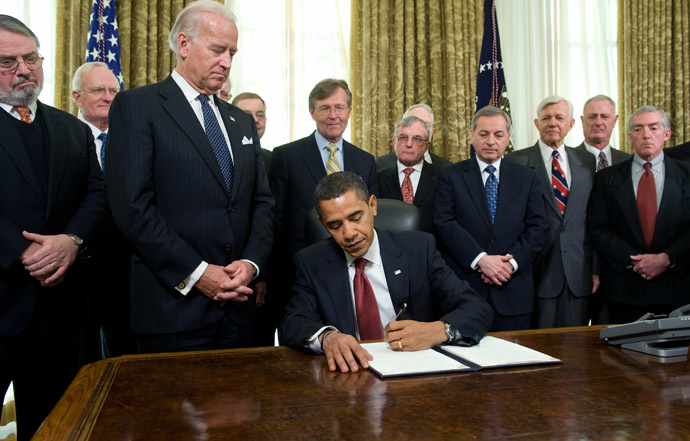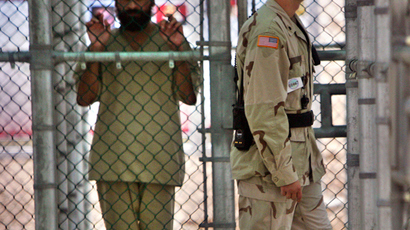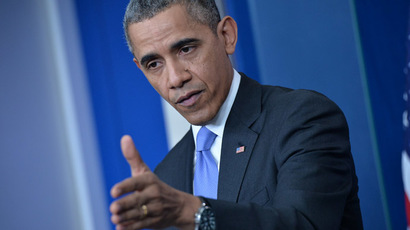“Guantanamo does not serve America’s interests”: Retired US generals urge Gitmo closure
Thirty-one retired US military personnel called upon Barack Obama to close Guantanamo Bay. The letter was signed on January 22, 2014, 5 years after the US president promised to close the facility holding detainees in limbo for years.
“Guantanamo does not serve America’s interests. As long as it remains open, Guantanamo will undermine America’s security and status as a nation where human rights and the rule of law matter,” says in the letter released by Human Rights First, the US independent advocacy organization.
The signatures come from most respected retired generals and admirals, such as retired General Joseph Hoar, the former head of the military's Central Command which oversees forces in the Middle East, and Charles C. Krulak, ex-Commandant of the Marine Corps.
The choice of the letter’s signing date, January 22, was not random. These US officials [the authors of the letter] stood behind the president on January 22, 2009 – Obama’s second day in office – when the orders to close probably the most controversial prison in the world were signed. Then the president promised that Guantanamo would be closed in a year - in 2010. However, that didn’t happen.
“Five years ago today members of our coalition of retired generals and admirals stood behind you in the Oval Office when you signed three executive orders that helped put our nation’s counterterrorism efforts on a stronger footing. [In one of the orders] You … put Guantanamo on the path to closure,” wrote the retired US officials.

In the letter, they also voiced concern about “the enduring and false debate over torture by the CIA.”
They called on the US administration to “fully cooperate” with the US Senate Select Committee on Intelligence to publicly release “the study that details the post-9/11 CIA rendition, detention, and interrogation program, adopted by [the Committee].”
“We believe that upon reviewing the facts the American people will agree that torture was not worth it, and that we as a nation should never return to the dark side,” they add in the letter.
Their remarks on torture came just some days after last Friday a US court rejected a former Gitmo detainee’s appeal to let him sue the US government over alleged torture during seven years of detention in the prison. Abdul Rahim Abdul Razak al-Janko, a Syrian, brought his lawsuit against the US government, back in 2010. Janko said he was imprisoned and tortured first by the Taliban in Afghanistan and then by the US military.
Arguably the world’s most infamous prison entered its 12th year of operation this January. The first detainees arrived [at Guantanamo Bay prison] on January 11, 2002. Overall out of 779 detainees held at Guantanamo in the past 12 years, only 7 have actually been convicted and sentenced.
Although Obama has talked on several occasions about the prison’s closure, it remains open and currently has 155 of detainees. 77 of them have been cleared for release.
The hunger strikes, which went on in the notorious Guantanamo Bay prison for over three months in 2013, are believed to be a major contributing factor to the Obama administration’s re-focus on the facility. At its peak in July, 106 of the 166 detainees were on hunger strike, with 45 of them being force-fed.
One of the problems is an opposition consisting mostly of Republican-dominated congress as many republicans stand against Gitmo closing.
According to Lindsay Graham, US senator from South Carolina, the Gitmo detainees are just “crazy bastards that want to kill us all.”
However, some civil rights advocates believe that the White House could be doing more.
“It’s only a president that can do it, and the idea that it’s Congress’s fault is not correct. It’s the president [Barack Obama] that is holding these men in detention,” says one the rights advocates to RT.
Still the administration wants to hold some people indefinitely, says one lawyer for Guantanamo inmate, Carlos Warner. “People held in Guantanamo are not the worst of the worst, they are mostly political problems. The idea that these men are terrorists is just not the case. It is belief now that many people [in Guantanamo] are innocent,” he says.














